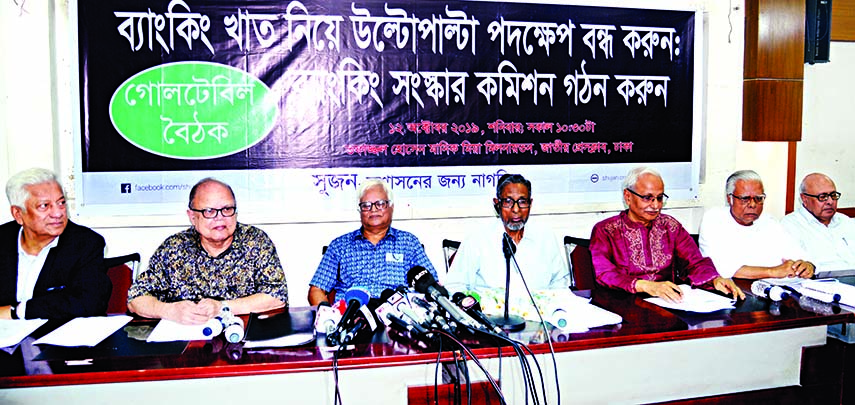
Staff Reporter :
Good governance campaigners on Saturday criticised the government’s ongoing effort to address the problems and irregularities that persisting in the country’s banking sector.
Terming it as ‘staged game,’ they alleged that the government and even all know the real cause of banking sector’s problems. But knowing that the government is not taking proper steps to solve these problems, which comes as a big encouragement for the large and willful defaulters.
They came up with the observations at a roundtable on banking sector arranged by Shushashoner Jonno Nagorik at the Jatiya Press Club.
The speakers also blame the culture of impunity enjoyed by loan defaulters and political interference in approving loans for bad condition of the banking sector.
“Banks are crumbling under the pressure of soaring non-performing loans (NPLs), while the government is favouring large borrowers with write offs and relaxed loan rescheduling policies. Such policies are intensifying the banking crisis further,” noted economist Prof Dr Mainul Islam said this while presenting the keynote paper at the programme.
NPLs of banks edged up to Tk 112, 425 crore as of June this year, accounting for 11.69 per cent of the total disbursed loans of Tk 9, 62,077.26 crore, according to the latest Bangladesh Bank (BB) data.
“Finance Minister AHM Mustafa Kamal said that he would not give to increase the default loan figure a single taka. He applied a trick to simplify the process of writing-off bad debt and offered relaxed loan rescheduling method. Different banks will now able to show less bad debts and classified loans using this method,” said Prof Mainul Islam.
He also mentioned that the figure of classified loans as provided by Bangladesh Bank is totally false and the actual amount of defaulted loans stand even much higher reaching nearly at Tk 300,000 crore. “The relevant authorities must stop the ill practice of hiding the true amount of defaulted loans,” he added.
The former economics Professor at Chittagong University, Dr Mainul Islam, further said a tribunal can be set up to bring the top 10 loan defaulters of every bank under justice.
Dr Mainul Islam said as long as the banking sector is forced to give long-term loans, there can be no solution to the problem of default culture. “A high-powered commission must be set up to make recommendations based on required analysis to reform the banking sector to get rid of the loan-defaulting.”
His other recommendations include reducing and merging weak banks, banning insider lending among banks and declaring Bangladesh Association of Banks illegal.
Shujan Secretary Dr Badiul Alam Majumder said economic mischief is sustained by political mischief. “Politics has to be ideology-based to eliminate economic mismanagement,” he opined.
Former deputy governor of Bangladesh Bank Khondokar Ibrahim Khaled said, “Although both the parties hate each other, Awami League and BNP have contributed to increasing the amount of defaulted loans.”
“Bangabandhu Sheikh Mujibur Rahman never boasted about the GDP, although country’s then GDP was nearly 8 per cent… to the current government, the GDP growth is the only development,” he added.
He highlighted that among the MPs of the country, 61.7 per cent are businessmen. “It proves that money is the source of power,” Ibrahim Khaled said.
BNP’s reserved seat MP Barrister Rumeen Farhana claimed that the government took no action against ‘bank robbers’. “Loan defaulters and fraudsters have been provided with many benefits but no action was taken against those who robbed Bangladesh Bank,” she said.
She also mentioned that the country’s stock market has been destroyed systematically.
Eminent columnist Syed Abul Maksud said, “Everyone is using the state as per will but we are unable to do anything.”
He sarcastically suggested that it would be better if people stop using banks and store money in their houses.
“The only way to bring order in the banking sector is to bring democracy and justice on the right track,” Abul Maksud added.
Prof Dr Rashed Al Mahmud Titumir of Dhaka University, former Agrani Bank Managing Director Syed Abu Naser Bukhtear Ahmed, Awami League Advisory Council Member Inam Ahmed Chowdhury and Shujan President Hafiz Uddin Khan also spoke on the occasion.
The speakers suggested the policy makers to take “effective measures” for addressing the rising trend in NPLs in the country’s banking sector. “Otherwise, the economic growth momentum and financial stability may hamper if the rising trend in classified loans continues,” they warned.

